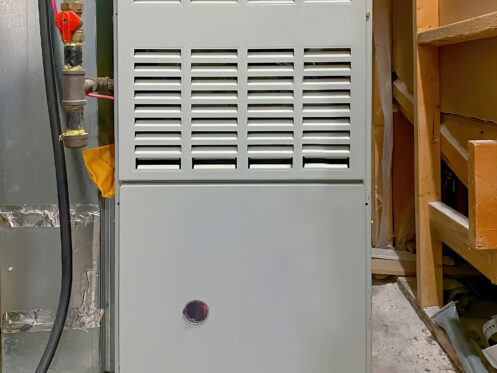Whenever the time comes that you need to replace the furnace in your Rockport, TX, home, you’ll want to carefully consider all of the available options to find the type and model that will best meet your home’s heating needs. The local climate is an important factor when choosing your new furnace since some types of furnaces work better in certain climates. In this guide, we’ll look at how gas and electric furnaces work in drier climates. We’ll also compare some of the other factors that will help you determine which type of furnace is right for your home.
How Gas and Electric Furnaces Work in Dry Climates
You’ll find some people who claim that gas furnaces are better in drier climates, as they believe that electric furnaces produce dry heat and will quickly sap moisture out of the air. This is a myth, and the laws of physics actually make it impossible. All types of matter, including water, can change states. Essentially, it can transform from a liquid to a gas. But matter cannot be created or destroyed. This means that a furnace can’t just make whatever water vapor there is in the air magically disappear so that the humidity level decreases. Water vapor is already evaporated and at the highest possible state, so it can’t just evaporate further and go away. The only way that the amount of vapor or moisture in the air can decrease is if it condenses into liquid.
Neither a gas nor an electric furnace will dry out the air any more than it already is, but both will make the air feel drier. The reason has to do with the difference between actual humidity and relative humidity. Humidity is simply a ratio of how many molecules of moisture there are in the air to how much “air” there is. Relative humidity is the percentage of moisture in the air compared to the maximum amount of moisture it could contain.
As the air temperature increases, the air molecules spread out so that there is more room for water vapor molecules. This means that warm air can always hold much more moisture than cold air. When a furnace runs and the air gets hotter, the relative humidity decreases even though the air still contains the same amount of moisture. This means that the hotter the air gets, the drier it will feel.
The reason that furnaces make the air feel drier has to do with how relative humidity affects the rate at which moisture evaporates out of your body. When the temperature increases and the relative humidity decreases, moisture will evaporate or wick out of your body quicker, so you feel drier. This is why any type of heating will make the air in your home start to feel drier even though the actual moisture content in the air stays the same.
The fact that gas and electric furnaces work the same in dry climates means you should instead focus on various other factors when deciding which type of unit is best for your home. Some of the most important factors include upfront cost, heating effectiveness, energy efficiency and life expectancy.
Cost of Gas vs. Electric Furnaces
An electric furnace will generally be the least expensive option. Electric furnaces not only cost less to purchase than gas furnaces, but they are also quicker and easier to install. Your installation costs will be lower.
Exactly how much more you can expect to pay for a gas furnace depends on the type of unit and its energy efficiency rating. A medium-efficiency condensing furnace will often cost a few hundred dollars more than an electric furnace. If you, instead, opt for a two-stage or variable-speed condensing furnace, you’re usually looking at spending at least a few thousand more.
Comparing Heating Effectiveness
Gas furnaces produce hotter air and pump out much more heat at a time, which means they are more effective and heat more quickly than electric furnaces. This is why electric furnaces are generally never recommended for much colder climates. In Texas, an electric furnace will usually work just fine since our winters are warmer and you rarely need your furnace to produce lots of heat.
Energy Usage and Efficiency
This is where comparing gas and electric furnaces can get a bit confusing. An electric furnace will always be more energy efficient than a gas furnace, but a gas furnace will cost less to run. One of the main reasons for this has to do with the amount of energy each type of furnace uses. Another important factor to consider is the cost of the fuel source. Electricity costs more than natural gas, and natural gas rates have remained steady or even decreased in recent years while the cost of electricity continues to rise.
Despite being more efficient, an electric furnace uses much more energy to produce the same number of BTUs of heat when compared with a gas furnace. This is again because electric heating produces less heat and is less effective than burning gas to produce heat. Gas furnaces are known for wasting more energy. This is usually offset by the fact that they use much less energy overall.
In colder climates, it would typically cost well over $1,000 more per year to heat a home with an electric furnace compared to using a gas furnace. In the Texas Gulf Coast area, the difference will often only be $100 to $200 per year since your furnace won’t need to run all that much. This means that it would often take a long time for a gas furnace to pay off since it would cost quite a bit more upfront.
Life Expectancy and Maintenance Requirements
Life expectancy is one area where electric furnaces definitely come out on top. The average lifespan of a new gas furnace is around 15 years, but you might be able to get 20 years out of a gas furnace in our area if you make sure it is well maintained. Most electric furnaces will last for 20 years at the very least, and many units can even continue working for 30 years. This is important to think about since the longer lifespan of an electric furnace helps to counterbalance the fact that it will use more energy.
Part of the reason that electric furnaces last longer is because they are much less complex and have fewer components. Electric furnaces also undergo less wear and tear, meaning they are less prone to breaking down or needing costly repairs. Any type of furnace should be maintained annually, but the maintenance requirements for an electric furnace are less than those for a gas furnace.
With more than 40 years of experience, Sigwald Service Co. is the most trusted heating and air conditioning company in the Rockport area. We offer a wide range of gas and electric furnaces, as well as financing for your new furnace (available on approved credit). Our certified technicians also specialize in furnace repairs and maintenance, as well as a full range of air conditioning services. For more information on our furnace installation services or to schedule a consultation to find the right furnace for your home, give us a call today.






